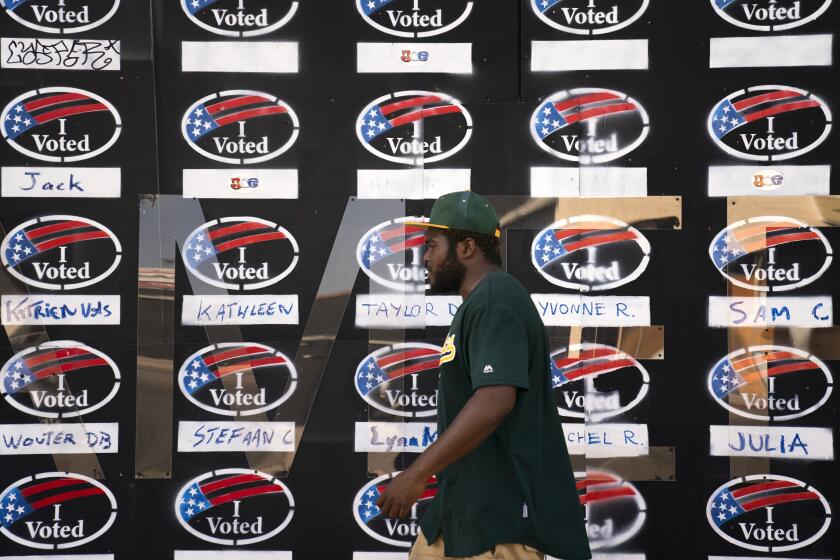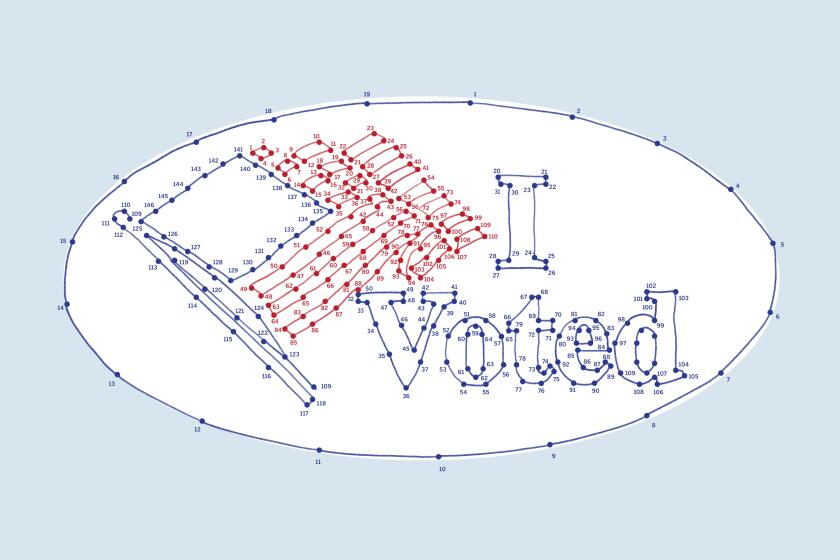Corporate campaign ads haven’t followed Supreme Court’s prediction
Reporting from Washington — The Supreme Court sent a wave of corporate and union money flooding into campaign ads this year, but it did so with the promise that the public would know — almost instantly — who was paying for them.
“With the advent of the Internet, prompt disclosure of expenditures can provide shareholders and citizens with the information needed to hold corporations and elected officials accountable for their positions,” Justice Anthony M. Kennedy wrote in January. “This transparency enables the electorate to make informed decisions and give proper weight to different speakers and messages.”
But Kennedy and the high court majority were wrong. Because of loopholes in tax laws and a weak enforcement policy at the Federal Election Commission, corporations and wealthy donors have been able to spend huge sums on campaign ads, confident the public will not know who they are, election law experts say.
Corporate donors have been able to hide their contributions despite the opposition of shareholders and customers — the very groups cited by Kennedy.
By an overwhelming margin, shareholders say they don’t want their companies devoting money to political ads. Customers are also easily angered by corporate political stands. In a recent case, Target Corp.’s chief executive was forced to apologize after it was revealed the company had donated $150,000 to the campaign of a Republican candidate in Minnesota who opposed gay rights. The retail chain faced a possible boycott led by gay rights activists.
“The biggest change this year is that it is no longer possible to identify the individuals who are responsible for funding election communications,” said Karl J. Sandstrom, a former FEC commissioner who advises Democrats on election law.
He called Kennedy’s opinion naive and said it reflected a “very uninformed view of how disclosure works.”
The high court ruling also has helped fuel the rise of several nonprofit political action groups, such as Republican strategist Karl Rove’s Crossroads GPS, that have poured millions into an election season that is quickly reaching exorbitant spending levels.
Business groups, unions and interest groups had spent $266 million as of Tuesday, according to the Center for Responsive Politics, including at least $128 million by groups that are not required to publicly disclose their donors. Some have said outside spending by conservative groups alone could reach $400 million this year.
The Public Campaign Action Fund, a group that advocates for public financing of campaigns, issued a report Tuesday predicting that House candidates alone could spend as much as $1.5 billion by the end of the campaign.
This year’s election marks the first time in 100 years that corporations and unions are free to spend their money on election ads. In the past, both companies and unions could encourage their employees or members to give money to political action committees, which in turn could pay for election ads.
But in January, the Supreme Court, by a 5-4 vote, struck down the legal ban on the use of corporate and union funds for direct election ads. In Citizens United vs. Federal Election Commission, the justices said that corporations had the same right to free speech as individuals, and for that reason the government could not stop corporations from spending to help their favored candidates.
In the same decision, however, an 8-1 majority upheld the disclosure laws as vital to democracy. That part of the ruling has gone largely ignored.
The reasons, said Tara Malloy, a lawyer for the Campaign Legal Center in Washington, are “weaknesses in the tax law, radical under-enforcement by the FEC and the failure of Congress” to enact a new disclosure law.
Under the tax code, nonprofit groups can register as “social welfare” or other organizations, meaning they can spend money on campaign ads without having their name disclosed as long as their primary activity is not political. In a little-noticed opinion in August, a divided FEC took the view that big donors who fund ad campaigns need not be disclosed unless the donor gave the money for a “particular advertisement.”
That is “an impossible-to-meet standard,” said former FEC Chairman Trevor Potter, counsel for Arizona Republican Sen. John McCain’s presidential campaign, saying that almost any contributor can remain anonymous.
Of course, some donors are happy to take credit for their political spending. In recent weeks, union leaders and officials of the U.S. Chamber of Commerce have boasted about how much they are spending.
But in many cases, anonymity is a way for donors to avoid backlash — and any unseemly appearances that they are trying to sway an election with big money.
Anonymity also provides protection to some corporate officials who might fear backing the wrong candidate. For example, if a company spent a large sum on ads urging the defeat of a powerful senator, it would have made an enemy if the senator won reelection.
Last week, Public Citizen and several other liberal advocacy groups complained to the FEC and accused the new political committees of evading the law.
The public needs “to know which corporations and billionaires are behind the attack ads now polluting our airwaves,” said Robert Weissman, president of Public Citizen.
But Bradley A. Smith, another former FEC chairman and a leading conservative foe of many of the campaign finance laws, said such disclosure was unnecessary.
“Voters do know who is funding the ads — every single one of them,” he said.
Smith said the U.S. Chamber of Commerce discloses its spending on election ads, as does Rove’s group, even if they do not specifically disclose their donors.
“Is there anybody who doesn’t know where the chamber is coming from?” he asked. “None of this troubles me in the least.”
Kim Geiger in the Washington bureau contributed to this report.
More to Read
Get the L.A. Times Politics newsletter
Deeply reported insights into legislation, politics and policy from Sacramento, Washington and beyond. In your inbox three times per week.
You may occasionally receive promotional content from the Los Angeles Times.











